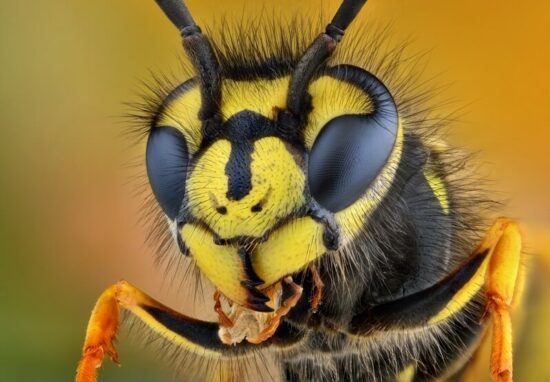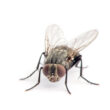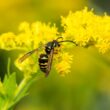Most people have heard enough about wasps to know that these are insects you shouldn’t mess with. But surprisingly, the details aren’t common knowledge!
“Do wasps sleep?” is one of the most common questions we get about these insects, and it makes sense. If wasps sleep at night then you’ll be less likely to get stung removing them when the sun is down.
But interestingly, the answer isn’t a simple “yes” or “no.” These critters are a bit more complicated than that, so you’ll need to do some homework to understand their nighttime habits.
Fortunately, this guide makes it easy.
Table of Contents
Do Wasps Sleep?
Wasps are one of the most feared backyard insects you might encounter. They’re relatively active during the day, buzzing around their nests and going out to find food. But have you ever seen one at night?
These stinging insects are noticeably absent at night. They retreat to the nest around dusk to wait for the sun to rise again.
But do wasps sleep?
Wasps do not sleep in a traditional sense. While many insects have a central nervous system that requires sleep-like behavior to recharge, it’s not the same type of sleep that humans and other mammals do.
Expert Tip: It’s worth pointing out that the behavior is similar to sleeping, and it’s easy to call it that. But from a biological sense, it’s technically not the same.
Studies show that wasps simply slow down. Metabolic functions become much less active, allowing the insect to slow down and get some rest.
If you were ever to see a wasp at night, it would likely look like it’s sleeping! These bugs are motionless at night. It’s a stark contrast to their daytime buzzing energy!
A vast majority of the worker bugs will “rest” without moving at night. However, a small number of them will take care of some nocturnal duties. These include repairing any damage to the nest and feeding larvae.
Some wasps will spend the night tending to the young to ensure they grow up strong and support the colony.
When Do Wasps Sleep?
Wasps “sleep” as soon as the sun goes down. The insects respond to their surroundings. They know to head back to the nest as the sun dips below the horizon during dusk hours.
The wasps might not understand the concept of time. However, they undoubtedly feel the effects of time and nighttime darkness.
You see, it’s not necessarily about getting shuteye or even resting the central nervous system. Studies performed by entomologists show that it has more to do with the absence of light and heat.
As the ambient temperature drops during the night, the wasps’ body temperature soon follows. That lack of heat is what causes the bug to slow down.
You can better see the effects of colder air temperatures as the winter season rolls around. Have you ever noticed that wasp sightings become less frequent as the fall season ends? By winter, seeing a wasp in the wild is impossibly rare!
That’s actually because most workers die! Wasps cannot handle cold temperatures. In the summer, the temperatures are high enough to keep living despite the dip at night. But when it gets even colder, the metabolic functions stop entirely.
Expert Tip: The only exception is the females. Females will eventually become queens in new colonies, so they survive the cold by finding crevices and warmer hiding spots. Once there, they go into a proper hibernation sleep for the winter.
They hibernate all winter long and emerge in the spring to lay eggs and start a brand-new population of wasps.
Will Wasps Sting Or Attack At Night?
Because wasps are so affected by the cooler temperatures of night, they’re much less likely to sting or attack at night. The insects have very little energy at night, so they avoid moving as much as possible.
But let’s be clear, they are fully capable of stinging you if they feel the need to protect themselves or the nest. The wasps aren’t buzzing with energy, so their threshold for going on the attack is higher at night. However, they can leap into action if the situation calls for it.
Contrary to popular belief, wasps usually don’t go into attack mode without a reason. You can encounter wasps during the day and not get stung. Most won’t pay you any mind!
They only sting people and animals when they feel threatened. If you go poking around their nest or try to swat at them, the insects will retaliate. But it’s all self-defense.
They won’t sting you as long as you don’t agitate the wasps! At night when they are sleeping, wasps are even less likely to sting you if you don’t bother them.
Can Wasps See At Night?
Here’s another reason why you don’t see wasps out at night. The bugs are relatively catatonic due to lower ambient temperatures. But even if they had the energy to stay active at night, they wouldn’t get very far due to their limited visibility.
Wasps cannot see very well at night. The only thing they can make out is light.
If you see a wasp at night, it will likely be around a porch light or another bright lamp. Because it’s the only thing they can see, wasps are inherently attracted to light. You might run across a wasp that didn’t make it back to the nest before it got dark.
In that case, it’ll head towards the nearest light source.
How Active Are They At Night?
Wasps aren’t very active at night. Everything works against them once the sun goes down.
The cooler temperatures slow down their metabolism and force them to rest (or “sleep”). Even in the hotter climates of the south, that modest decrease in nighttime temperatures is enough to make the bugs somewhat lethargic.
Pair that with their inability to see, and wasps don’t have much choice but to “sleep.” Most bugs will not move much at night. While it’s not a traditional form of sleep, it’s the closest thing these bugs will get.
If you observe a nest at night, you might notice some mild activity. As mentioned earlier, some wasps will keep working. Their duties aren’t super physically taxing, so it’s still manageable despite the lack of light and low temperatures.
While daytime workers have to take flight and find food, the night shift wasps can stay at home. They spend the night repairing the nest and tending to the larvae.
Expert Tip: The nest repairs involve using wood fiber and pulp. Meanwhile, larvae care typically consists of feeding the young or repairing the cells they live in.
Is It Safe To Remove A Wasp Nest At Night?
You might have heard advice about removing wasps nests at night. Those tips aren’t just old wives’ tales! The best time to get rid of a wasp nest is at night! That’s when they’re least active and less likely to sting you.
The goal is to catch the insects by surprise and eliminate them before they have a chance to get agitated and defend themselves. During the day, wasps are fully alert and aware of your presence. While you could certainly get the job done during daylight hours, it’s more of a challenge. It’s also far riskier.
At night, have the benefit of darkness and lower general activity. Of course, your actions could alert the wasps if you’re not careful.
For example, shining a bright spotlight on the nest before taking action is not a good idea. The light will blow your cover and give the wasps a visible target to attack!
Expert Tip: Remember that wasps can still sting at night. Even if they’re “sleeping,” the bugs will spring into action if they need to defend themselves or the nest. As a result, you must be cautious.
The best way to remove a wasp nest is to use a spray (here’s a guide on how they work). There are plenty on the market.
Pop on a respiratory mask to protect yourself from the fumes. Then, douse the nest and stand back. The pesticide should kill the bugs within seconds.
Once the workers are taken care of, you can physically remove the nest to prevent any survivors from returning.
Conclusion
While wasps don’t sleep the same way we do, they slow way down. That makes night the perfect time to deal with a particularly pesky nest if you want to minimize the chance of being stung.
If you have any other questions about the sleeping habits of wasps or how they behave during the night, let us know! We’re more than happy to weigh in.


